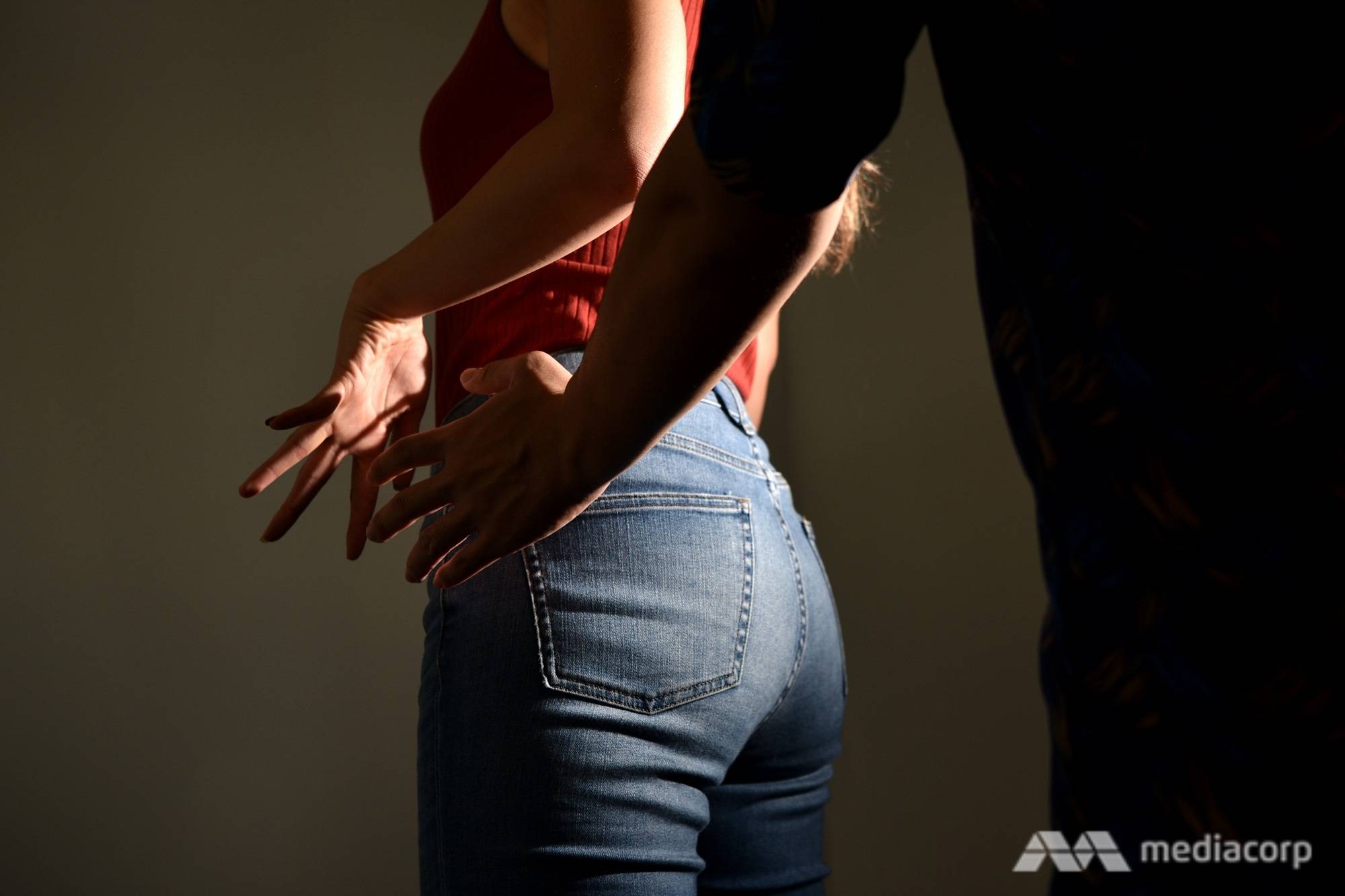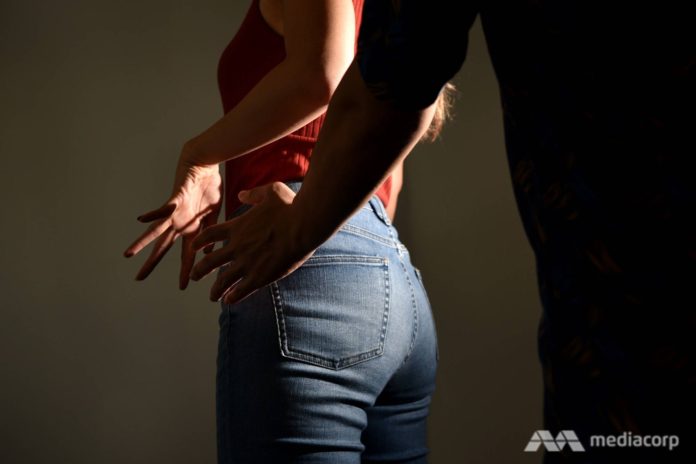SINGAPORE: We have been here before.
A case of sexual assault is reported in the media. Comments focusing on the victim’s behaviour start to proliferate on social media. Several people – mostly women – push back, pointing out that these comments are steeped in simplistic myths and misconceptions about sexual assault.
But no one’s mind seems to change. Another case is reported. And the cycle repeats itself ad nauseum.
This time, the case involves a former Grab driver. He is on trial for assaulting a drunk woman he picked up from a bar downtown. She was found the following morning without her skirt and underpants, on a road outside her apartment, by another Grab driver.
That same day the driver claimed trial, another case of a drunk woman who went over to her friend’s apartment, where she was sexually assaulted by the friend’s brother, was heard in court
READ: Commentary: Does the ride-hailing industry have a sexual harassment problem?
READ: Commentary: Here’s what zero tolerance towards sexual misconduct looks like
Many people responded to media reports of these cases with empathy and support for the survivors.
But soon enough, other comments popped up, many depressingly predictable and seen before: Blaming the victim for being assaulted because of how much she had to drink and offering unsolicited advice to women about the ill fate that can befall them if they go out at night.
RAPE MYTHS INVOLVING INTOXICATED WOMEN
Around the world, a woman’s consumption of alcohol often becomes a thorn in the side of her reputation and the veracity of her claims, particularly in cases of sexual assault.
Pair women with alcohol, and our perceptions seem to warp. Women who drink frequently are seen as promiscuous.
A 2019 study by researchers at Iowa State University of respondents based in the United States found that just holding a beer bottle increased perceptions of sexual availability for women – i.e. they were more likely to be seen as single or open to having casual sex.

Photo illustration of a man committing molest. (Photo: Jeremy Long)
Alcohol features in rape myths – a set of beliefs that downplay, discredit or justify sexual assault claims – by reinforcing the idea that survivors have contributed to their own fate and are responsible for what happened to them.
“She could have avoided the assault if she hadn’t made herself vulnerable by drinking alcohol” is a common refrain. One result of this is that sexual assault survivors forced to drink are typically accorded more public sympathy than those who drank out of their own volition.
BLAMING THE VICTIM, EXCUSING THE PERPETRATOR
While alcohol is usually pointed to as a survivor’s fatal mistake, it is often an excuse for a perpetrator’s “careless, unintentional” actions.
READ: Commentary: She’s practically asking for it? Do Singaporeans subscribe to rape myths?
READ: Commentary: Why would anyone steal underwear – and flout circuit breaker restrictions to do that?
A 2010 study of 288 students in Germany found evidence of this double standard: Respondents held intoxicated perpetrators less responsible for their sexually aggressive actions, while holding intoxicated victims more responsible for being victims of sexual assault.
In some cases, perpetrators use this to their advantage as a defence against allegations of sexual assault, arguing that their intoxication equates to diminished responsibility.
In the United Kingdom, courts have entertained involuntary intoxication as a possible defence, but have generally ignored the defendant’s voluntary intoxication in establishing criminal intent to commit sexual violence. But drunken intent is still intent.
Alcohol affected their cognitive and motor skills, they say, impairing their ability to process and react to verbal and non-verbal behaviour. In that state, it was not their fault, they say, that they forced themselves on someone, ignoring the other person’s non-consent.
File photo of a man holding a glass of beer in an outdoor pub in Moscow. (Photo: AFP/Dmitry Kostyukov)
There is indeed a plethora of evidence showing that alcohol often leads to bad decisions and actions. But we don’t typically use alcohol to excuse perpetrators of any other crime. When a drunk driver crashes his car, nobody balks at penalising him for his decision to drink and drive.
So why is sexual assault treated differently? When a drunk man assaults a drunk woman, why don’t we first tell men not to drink, before telling the same to women?
Underlying all this is, perhaps, the pessimistic assumption that “men can’t help themselves”. Why cajole a person for something they can’t control, this line of thinking goes. Best to advise the person who is in control of herself.
The toxic assumption is that men can’t help but molest, harass and hurt those around them. It’s how they are wired.
Are men offended by this line of thinking that erases their sense of decency, agency and cognitive abilities? They should be. We are, on their behalf.
READ: Commentary: Terms like ‘lucky boy’ and ‘men will be men’ are problematic double standards
READ: Commentary: Goodbye to those days, when women were ‘pieces of meat for men to slice’
As survivor Chanel Miller writes in her book, “I understand you are not supposed to walk into a lion’s den because you could be mauled. But lions are wild animals. And boys are people, they have minds … Groping others was not a natural reflex, biologically built in.”
Miller, whom Stanford swimmer Brock Turner assaulted while she was incapacitated, asks: “Why was passing out considered more reprehensible than fingering the passed-out person?”
HOW DRUNK IS ‘DRUNK’?
We know – or should know by now – that an unconscious person cannot agree to sexual activity. Neither can someone who is intoxicated to the point of incapacity.
But what does “incapacity to consent” really mean? How do we establish boundaries between being “very drunk” and “incapacitated”?
READ: Commentary: Male victims of rape deserve support and understanding, not ridicule and disbelief
File photo.
Singapore’s Penal Code says that the person must be unable to understand the nature and consequence of the act to which they give their consent.
To determine this, courts have looked at factors such as how aware the complainant was of their surroundings, physical weakness, nausea, if they were slipping in and out of sleep, control over motor movements, whether the complainant remembers significant details of behaviour or the incident itself, and others.
Yet, sometimes, the court of public opinion sets an impossible bar for victims to clear. If the victim doesn’t remember all the details of the incident, public observers and netizens are quick to deem her whole account unreliable.
On the other hand, if she does remember the incident, then maybe she wasn’t so drunk that she was incapable of consenting.
READ: Commentary: Isolated with your abuser? Why family violence seems to be on the rise during COVID-19 outbreak
READ: Commentary: Here’s what women really want regarding gender equality
We seem to ask victims to be a Goldilocks-style “just the right amount” of drunk: Incapacitated, but with an unblemished, consistent memory of the assault. We can be quick to condemn a victim of sexual assault so long as she drinks.
Yet the ugly truth is many instances of sexual assault go unreported. Seven out of 10 survivors who come to AWARE’s Sexual Assault Care Centre (SACC) do not end up filing a formal report.
Rape myths, and in particular attitudes and perceptions that observers and bystanders hold towards sexual assault victims, play a crucial role in influencing these decisions.
These attitudes and perceptions play an important role in the victim’s treatment and recovery, as well. Research has found that negative social reactions, including social media comments, are significantly associated with increased psychological distress and delayed recovery.
READ: Review on women’s issues goes beyond the law, aims to ‘deeply ingrain’ gender equality in society: Shanmugam
This is why we often tell our clients to stay away from social media when their cases are in the news. And why we need social media users to think twice about the comments they may mindlessly shoot off about sexual assaults.
ADDRESSING RAPE MYTHS
Rape myths have to be dismantled before they pile damage onto another survivor, beyond what she has already suffered during her assault.

Photo illustration of a man attempting to commit an outrage of modesty against a woman. (Photo: Jeremy Long)
One way to do this is to introduce gender role education in all sexuality education programmes in Singapore. Instead of shying away from talking about sexual consent, we need to build a culture of consent in all social situations.
Attitudes towards sexual assault are often linked to traditional gender roles, including socially sanctioned behaviour for boys and girls we as parents, guardians and adults intentionally or unintentionally perpetuate – forward, even aggressive and domineering for the former, chaste and passive for the latter.
Let’s teach our children how empty those stereotypes are and what a respectful relationship when it comes to sex looks like.
Shailey Hingorani is Head of Research and Advocacy at AWARE.





